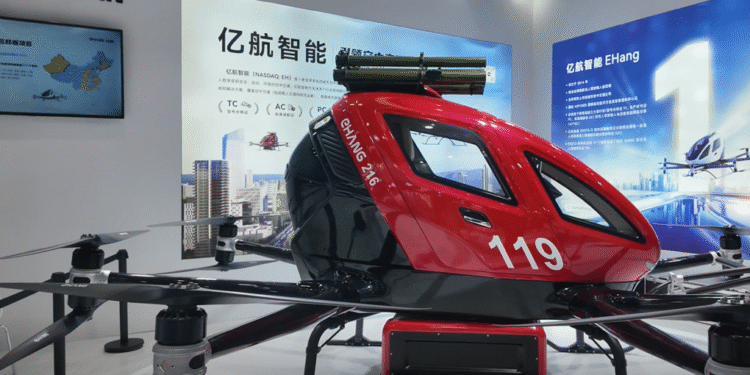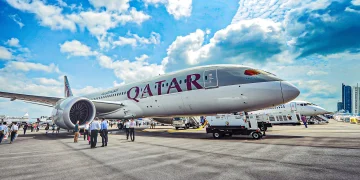Saudi Arabia will make history this November as the first Middle Eastern country to launch commercial air taxi services for paying customers. The kingdom has partnered with Chinese aviation company EHang to deploy fully autonomous aircraft across 22 airports nationwide.
The announcement comes after successful trials in Makkah earlier this year proved the technology works safely in real-world conditions. Front End Limited Company, a Saudi tech firm, signed the deal with EHang and Cluster 2 Airports to bring the pilotless vehicles into commercial operation.
Saudi Arabia Beats Global Competition to Market
This move puts Saudi Arabia ahead of Dubai and other regional competitors in the race to commercialize air taxis. The kingdom will transform from testing concepts to operating real passenger services that people can actually book and pay for.
Majid Alghaslan, chairman and CEO of Front End, told reporters the company will start with passenger rides in November. The service will then expand across the Cluster 2 airport network in 2026 and 2027 to build a truly national air mobility system.

EH216-S Aircraft Specifications and Pricing
The passenger aircraft, called the EH216-S, carries two people without a pilot. The fully electric vehicle has 16 propellers and can fly up to 35 kilometers on a single charge. It reaches speeds of 100 kilometers per hour and stays airborne for 21 minutes per flight.
EHang prices the aircraft at $410,000 for international markets. Early reports suggest passenger fares will start around $5.73 per mile, dropping to $0.44 per mile as operations scale up.
The aircraft already holds type certification from China’s Civil Aviation Administration. Saudi aviation authorities worked with EHang to ensure the vehicles meet local safety standards and regulations.
Saudi Aviation Strategy Powers Air Taxi Push
The General Authority of Civil Aviation launched Saudi Arabia’s Advanced Air Mobility Roadmap in August 2024. The comprehensive strategy outlines how unmanned and vertical-takeoff vehicles will be certified, monitored, and integrated into national airspace.
The roadmap identifies key benefits including reduced traffic congestion, fewer road accidents, and contributions to sustainability goals. Officials expect the technology to attract foreign investment and help localize advanced aviation technologies within the kingdom.
This air taxi launch directly supports Vision 2030’s goals to position Saudi Arabia as a global aviation hub. The kingdom wants to double passenger capacity to 330 million annually while establishing itself as a leader in transportation innovation.
Logistics and Cargo Operations Included
Beyond passenger transport, the partnership includes cargo operations using EHang’s EH216-L logistics version. This aircraft variant handles cargo delivery, public safety missions, and government operations across the kingdom.
The cargo capabilities address supply chain challenges and create new opportunities for businesses to move goods quickly between cities. Emergency services and government agencies will also use the aircraft for rapid response operations.
Regional Air Taxi Competition Heats Up
Saudi Arabia’s commercial launch puts pressure on other Gulf states to accelerate their air taxi programs. Dubai has partnerships with Joby Aviation for future services, while Abu Dhabi works with Archer Aviation on similar projects.
However, Saudi Arabia’s move to paying passenger operations gives it a significant first-mover advantage in the regional market. The kingdom will establish itself as the Middle East’s primary hub for autonomous aerial mobility.
The low-altitude economy sector is projected to reach $150-200 billion globally by 2030. Urban air mobility alone could contribute $25-30 billion of that total, driven by passenger transport and smart city integration.
Economic Impact and Job Creation
The air taxi deployment creates new economic opportunities across multiple sectors. Aviation maintenance, traffic management systems, and passenger services will require specialized workers and infrastructure development.
Front End emphasized that the project goes beyond transportation to build foundations for a low-altitude economy. Urban Traffic Management systems will integrate air taxi operations into Saudi Arabia’s urban skies, enabling regulated aerial mobility at scale.
The initiative also positions Saudi Arabia to attract global investment in advanced mobility technologies. International companies seeking to test and deploy air taxi services may choose the kingdom as their regional base of operations.
Saudi Arabia’s bold step into commercial air taxi operations demonstrates how Vision 2030 transforms ambitious plans into operational reality. The November launch date gives the kingdom a crucial head start in building the Middle East’s first comprehensive air mobility network.














